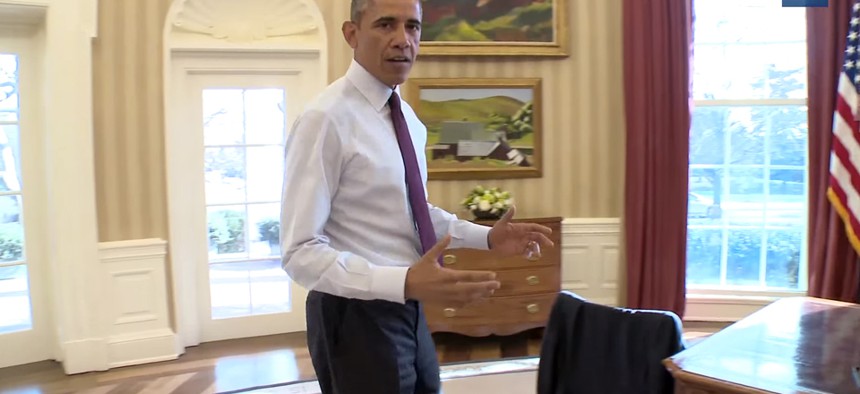
Obama announced the plan in a video on the White House site. White House via YouTube
President Backs Government-Run Internet Networks
Obama wants to overturn state laws that restrict cities from building their own networks.
President Obama will travel to Cedar Falls, Iowa, on Wednesday to tout the ability of local governments to provide high-speed Internet to their residents.
And he will urge the Federal Communications Commission to strike down state laws around the country that restrict the ability of cities to build their own broadband networks. The move is likely to draw fire from Republicans, who argue that states should be free to set their own policies—including restrictions on local governments.
"Laws in 19 states—some specifically written by special interests trying to stifle new competitors—have held back broadband access and, with it, economic opportunity," the White House wrote in a fact sheet . "Today, President Obama is announcing a new effort to support local choice in broadband, formally opposing measures that limit the range of options available to communities to spur expanded local broadband infrastructure, including ownership of networks."
Telecom and cable companies have been lobbying for the state laws, arguing that it's not fair for them to have to compete with government-owned Internet providers. The companies claim the city projects discourage private investment and are often expensive failures. House Republicans passed legislation last year to protect the state laws from FCC action.
But the White House argues that many Americans lack any option for fast, affordable Internet service from private providers. Some cities have built their own networks offering speeds 100 times faster than the national average.
In a video released Tuesday, Obama explains that Cedar Falls, a city of just 40,000 people, provides broadband speeds that rival what is available in Seoul, Hong Kong, and Paris.
"The reason they can compete with these other cities is citizens got together and made the investment to bring competition in and make sure Internet speeds were just as fast there as anywhere else," Obama said. "That gives them a huge competitive advantage. It means a business can come in and locate there knowing that they can hook into world markets, products, services, anywhere around the globe."
Chattanooga, Tenn., and Wilson, N.C., filed petitions last year asking the FCC to nullify their states' laws limiting municipal broadband projects. The Obama administration plans to file a letter urging the FCC to side with the local governments.
FCC Chairman Tom Wheeler has already indicated he is likely to strike down the state limitations. "I believe that it is in the best interests of consumers and competition that the FCC exercises its power to preempt state laws that ban or restrict competition from community broadband," he said last year.
It's not the first time that Obama has waded into a debate at the FCC, an independent agency that is not bound to comply with his wishes. In November, he urged the agency to enact the "strongest possible" net-neutrality regulations to ensure users can access whatever online content they choose.
In addition to asking the FCC to strike down the state limits, the White House plans to host a summit of mayors and county commissioners who want to build their own broadband projects. And the Commerce Department will provide resources and tools to help local officials get the projects off the ground.
The White House also plans to create a Broadband Opportunity Council to examine government regulations that may be holding back broadband deployment. The Agriculture Department plans to relaunch a program to provide loans to rural broadband providers.







